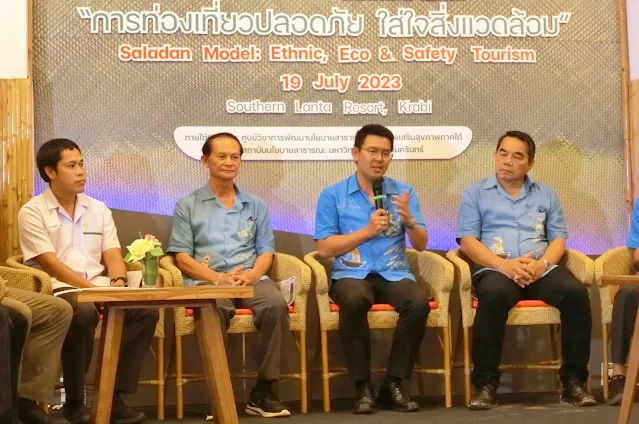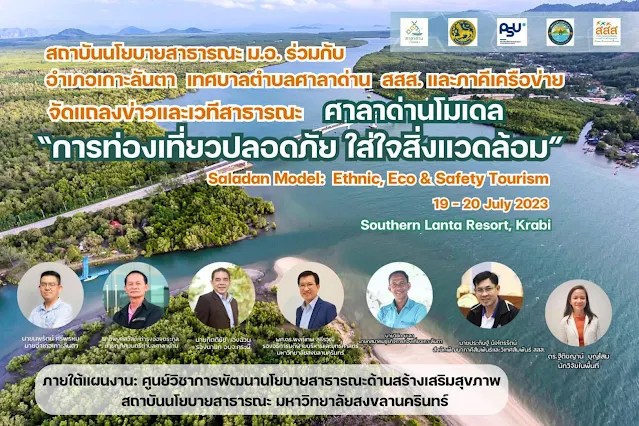"Sala Dan Model" (“ศาลาด่านโมเดล”) is a result of integrating academic studies and activities into policy proposals for sustainable development gearing towards Lanta Declaration.
Through the collaborative efforts of the Public Policy Institute of Prince of Songkla University (PSU), Sala Dan Subdistrict, together with public sector, private industry, and civil society, the local development project is promoted to support the Lanta Declaration and create a prototype tourism route called the "Sala Dan Model." This route connects from Moo 1, Ban Sala Dan to Moo 5, Ban Loh Doo Yung, and Moo 4, Ban Thung Yi Peng. It becomes a unique tourism link that encompasses both natural resources and the environment, as well as cultural heritage. It aims to promote ethnic tourism and ecotourism, conserving natural resources, cultural identity, and enhancing the economic value for the local community.
1. Recognizing the importance of jointly conserving and maintaining the abundance of natural resources, both on land and at sea, in Ko Lanta.
2. Respecting diverse cultural heritages, coexisting harmoniously in a multicultural society, including Thai Buddhist, Muslim, Chinese, and Urak Lawoi people.
3. Supporting activities that boost the local economy, strengthen the community, provide stable income for the people, and improve their quality of life, fostering a happy society.
4. Being adaptable and learning to cope with changes, including natural disasters, public hazards, and social transformations.
The results are expected to be the starting point for collaborative efforts in the development in this area, involving cooperation from all sectors and contributing to the sustainable development.
The "Sala Dan Model" is derived from the results of academic research and practical work in the area, developed into a policy proposal as part of the support project on Lanta Declaration gearing towards sustainable development. Public Policy Institute of Prince of Songkhla University, and the Office of Academic Cooperation, in collaboration with the Ko Lanta District and Sala Dan Subdistrict, work together to promote and establish safe and environmentally conscious tourism in the "Sala Dan Model". Ethnic Tourism (collaborative effort with Urak Lawoi, aboriginal people in the area) and Eco Tourism are combined with Safety Tourism to adapt to ever-changing situations.
Asst. Prof. Dr. Pongtep Sutthirawut, the Vice President for Administration and Strategy of Prince of Songkhla University, stated that the Public Policy Institute, Prince of Songkhla University (PPI) has worked on academic services in the region to support development activities, with funding support from the Thai Health Promotion Foundation in collecting and creating resources database, including natural resources, cultural heritage, economy, and preparedness for natural threats, public hazards, natural disasters, and social changes. It is a collaborative effort to enhance stability in terms of economy, society, cultural norms, health, and the environment. Additionally, it is a part of the support for the Lanta Declaration by Ko Lanta District. There is a data collection process in the area and a platform for stakeholder participation, with researchers from the Public Policy Institute, applying academic principles to analyze and summarize data for decision-making in prototyping Sala Dan Subdistrict as the model route for "Safe Tourism, Environmental Consciousness". It will be one if the guidelines presented as a public policy to the Subdistrict for future development.
Mr. Nopparat Siprom, Chief District Officer of Lanta District, expresses his delight and gratitude towards the Public Policy institute, Prince of Songkhla University, Thai Health Promotions Foundation, and various communities for their collaboration with the Sala Dan Subdistrict and the Ko Lanta District. He recognizes this project as an important part of the Lanta Declaration and a shared commitment to the development of Sala Dan Subdistrict and Ko Lanta District. With that bing said, the particular interest is the development of mainstream tourism in conjunction with community-based tourism and ethnic tourism in the Sala Dan Subdistrict. This will create sustainable development, providing benefits to the local community. The challenge lies in how to help the Toh Ba Leau community (Moo.1) of Sala Dan Subdistrict, a community of Urak Lawoi with unique ethnic and cultural characteristics, preserve and share their way of life, tradition, culture, livelihood, and traditional fishing. All of these aspects are worthy of preservation and interest. These efforts are interconnected and aim to conserve and demonstrate the local identity while ensuring safe tourism. They extend to ecotourism in the Mangrove Forest area, starting from Baan Sala Dan in Moo 1 to Baan Loduyong in Moo 5 and important tourist communities like Baan Thung Yi Peng in Moo 4. This will be a significant highlight that will drive the Sala Dan Model in line with the Lanta Declaration and sustainable development in Krabi Province.
Mr. Pongsawat Damrongongtrakul, Mayor of the Sala Dan Subdistrict, has discussed about the development of the area to ensure the well-being, happiness, good environment, good economy, safety, and adaptability to various changes for the residents of Sala Dan Subdistrict. The policy proposal presented by the educational institution is the result of a collaborative process, which is crucial in enhancing the development of Sala Dan Subdistrict. He expresses gratitude to the Prince of Songkhla University, Thai Health Promotion Foundation, and all stakeholders. He considers this an excellent opportunity and will present it to the subdistrict through the collaborative process, which will be highly beneficial if it can be implemented according to the plan. This will empower the people in the area to work and build their own communities, especially in Moo 5, which will be linked to tourism in Thung Yee Peng. Regarding the development plan, a participatory and fair approach will be used since Sala Dan Subdistrict is comprised of various religions and cultures, known as multiculturalism. It includes Thai Muslims, Thai Buddhists, Urak Lawoi people, Chinese Overseas descendants, and tourists from various parts of the world. The Sala Dan Model must demonstrate and promote an awareness of the way of life and identity of Sala Dan, as well as provide narrative for visitors to understand and respect the community.
Mr. Vichit Yala, the President of the Ko Lanta Tourism Association, talks about the development of mainstream tourism and alternative tourism, which refers to community-based tourism. It is necessary to support and strengthen community-based tourism as it plays a crucial role in taking care of natural resources, the environment, and cultural heritage. The design of tourist routes for the Sala Dan Model, which serves as a connecting route, is highly beneficial in increasing the value and worth of tourism from mainstream tourists. It will also contribute to improving the quality standards of tourism services. Regarding safety, it is necessary and essential to be prepared for various disasters. It will instill confidence in the residents of Ko Lanta and tourists. The private sector is very pleased to cooperate with both the Ko Lanta District and the Sala Dan Subdistrict in supporting the development of the Lanta Declaration and the promotion of new alternative tourism sites. The academic institution is also seen as a valuable partner in upgrading knowledge and potential in the area.
Mr. Pradit Nitrat from Thai Health Promotion Foundation, which is the funding agency for this project, said about the collaboration in this initiative. The mission of the Thai Health Promotion Foundation is to promote well-being of Thai people in four dimensions: physical, mental, social, and intellectual. The Sala Dan Model is collaboration between academic sector, local communities, and various stakeholders. The main focus is on the sustainability of natural resources and the environment, as well as their connection to the economy and cultural society. These efforts will ultimately contribute to improving the overall quality of life for the people of Lanta Island. Thai Health Peomotion Foundation is pleased and prepared to participate in ensuring that the residents of Lanta Island and visitors have opportunities for meaningful development and live in a society that is aligned with the global changes of the current era.
---------------------------------------------------------------------
“ศาลาด่านโมเดล” จากผลการศึกษาและปฏิบัติงานวิชาการในพื้นที่ พัฒนาสู่ข้อเสนอเชิงนโยบายเป็นหนึ่งในโครงการหนุนเสริม ปฏิญญาอ่าวลันตา การขับเคลื่อนสู่การพัฒนาที่ยั่งยืน
โดยความร่วมมือของสถาบันนโยบายสาธารณะ มหาวิทยาลัยสงขลานครินทร์ (สนส.ม.อ.) สำนักงานกองทุนสนับสนุนการสร้างเสริมสุขภาพ (สสส.) อำเภอเกาะลันตา เทศบาลตำบลศาลาด่าน และภาคีเครือข่ายทั้งภาครัฐ เอกชน ประชาชน ร่วมขับเคลื่อนงานการพัฒนาท้องถิ่น หนุนเสริมปฏิญญาอ่าวลันตา เกิดเส้นทางท่องเที่ยวต้นแบบ “ศาลาด่านโมเดล”
จากพื้นที่ หมู่ 1 บ้านศาลาด่าน เชื่อมโยงมายัง หมู่ 5 บ้านโล๊ะดุหยง และ หมู่ 4 บ้านทุ่งหยีเพ็ง เป็นเส้นทางเชื่อมโยงการท่องเที่ยวที่มีรูปแบบอันเป็นอัตลักษณ์ ทั้งด้านทรัพยากรธรรมชาติและสิ่งแวดล้อม รวมทั้ง ด้านวิถีวัฒนธรรม เป็นการท่องเที่ยวเชิงชาติพันธุ์ (Ethnic Tourism) และการท่องเที่ยวเชิงอนุรักษ์ (Eco Tourism) เพื่อรักษาฐานทรัพยากรธรรมชาติ วิถีอัตลักษณ์วัฒนธรรม และเพิ่มคุณค่า มูลค่าทางเศรษฐกิจชุมชน
1) การเห็นความสำคัญและร่วมกันอนุรักษ์ รักษาฐานทรัพยากรธรรมชาติ ทั้งทางบก ทางทะเล เกาะลันตาให้มีความอุดมสมบูรณ์
2) เคารพในวิถีวัฒนธรรมหลากหลาย สังคมพหุวัฒนธรรม ไทยพุทธ มุสลิม จีน ชาวเล-อุรักลาโว้ย อยู่ร่วมกันอย่างเกื้อกูล สันติ สามัคคี
3) สนับสนุนกิจกรรมที่ส่งเสริมให้เศรษฐกิจท้องถิ่น ชุมชน มีความเข้มแข็ง ประชาชนมีรายได้มั่นคง มีคุณภาพชีวิตที่ดี เป็นสังคมสุขภาวะ
4) ความเท่าทันและเรียนรู้ในการตั้งรับปรับตัวกับความเปลี่ยนแปลง ทั้งภัยคุกคามทางธรรมชาติ ภัยพิบัติ สาธารณภัยและความเปลี่ยนแปลงทางบริบทสังคม
ผลจากการดำเนินงานในครั้งนี้ หวังว่าจะเป็นการเริ่มต้นจุดประกายความร่วมมือในการพัฒนาพื้นที่ โดยความร่วมมือจากทุกภาคส่วน และเป็นส่วนหนึ่งในการหนุนเสริมปฏิญญาอ่าวลันตาเพื่อการพัฒนาอย่างยั่งยืนต่อไป
“ศาลาด่านโมเดล” จากผลการศึกษาและปฏิบัติงานวิชาการในพื้นที่ พัฒนาสู่ข้อเสนอเชิงนโยบายเป็นหนึ่งในโครงการหนุนเสริม ปฏิญญาอ่าวลันตา การขับเคลื่อนสู่การพัฒนาที่ยั่งยืน
สถาบันนโยบายสาธารณะ มหาวิทยาลัยสงขลานครินทร์ และ สสส. สานพลังความร่วมมือทางวิชาการ ร่วมกับอำเภอเกาะลันตา และเทศบาลตำบลศาลาด่าน ร่วมผลักดันและสร้างความร่วมมือเพื่อสร้างการท่องเที่ยวปลอดภัย ใส่ใจสิ่งแวดล้อม พื้นที่ต้นแบบ “ศาลาด่านโมเดล” การท่องเที่ยวเชิงชาติพันธุ์ชาวเลอุรักลาโว้ย (Ethnic Tourism) และการท่องเที่ยวเชิงอนุรักษ์ (Eco Tourism) ควบคู่กับการสร้างความปลอดภัย (Safety Tourism) เท่าทันต่อสถานการณ์ความเปลี่ยนแปลง
ผศ.ดร.พงค์เทพ สุธีรวุฒิ รองอธิการบดีฝ่ายบริหารและยุทธศาสตร์ มหาวิทยาลัยสงขลานครินทร์ ได้กล่าวว่า สถาบันนโยบายสาธารณะ มหาวิทยาลัยสงขลานครินทร์ (สนส.) ได้ลงมาทำงานบริการวิชาการในพื้นที่เพื่อหนุนงานการพัฒนา โดยได้รับทุนสนับสนุนจากสำนักงานกองทุนสนับสนุนการสร้างเสริมสุขภาพ (สสส.) ในการรวบรวมจัดทำฐานทรัพยากรในพื้นที่ ทั้งฐานทรัพยากรธรรมชาติ วิถีวัฒนธรรม เศรษฐกิจ และการเตรียมรับมือกับความเปลี่ยนแปลงทั้งภัยคุกคามทางธรรมชาติ สาธารณภัย ภัยพิบัติและความเปลี่ยนแปลงทางสังคม เป็นการร่วมคิดร่วมสร้างให้เกิดความมั่นคงทั้งด้านเศรษฐกิจ สังคม วิถีวัฒนธรรม สุขภาพ และสิ่งแวดล้อม และเป็นส่วนหนึ่งในการสนับสนุนปฏิญญาอ่าวลันตา ของอำเภอเกาะลันตา มีกระบวนการการรวบรวมข้อมูลในพื้นที่ และการจัดเวทีการมีส่วนร่วมแสดงความคิดเห็น มีนักวิจัยจากทางสถาบันนโยบายสาธารณะ มหาวิทยาลัยสงขลานครินทร์ นำหลักวิชาการมาวิเคราะห์สรุปเป็นข้อมูลประกอบการตัดสินใจ ในการเลือกโซนในตำบลศาลาด่าน เป็นพื้นที่ต้นแบบ ศาลาด่านโมเดล เส้นทางต้นแบบ “การท่องเที่ยวปลอดภัย ใส่ใจสิ่งแวดล้อม” และได้นำเสนอเป็นนโยบายสาธารณะให้กับทางเทศบาลตำบลศาลาด่านประกาศเป็นนโยบายการพัฒนาต่อไป
นายนพรัตน์ ศรีพรหม นายอำเภอเกาะลันตา มีความยินดีและขอบคุณทางสถาบันนโยบายสาธารณะ มหาวิทยาลัยสงขลานครินทร์ และสสส. และภาคีต่าง ๆ ที่ได้มาขับเคลื่อนกับทางเทศบาลตำบลศาลาด่าน ร่วมกับทางอำเภอเกาะลันตา ทางผู้นำ ท้องที่ ท้องถิ่น ของตำบลศาลาด่าน ถือว่าเป็นโครงการที่สำคัญ ในการที่จะเป็นส่วนหนึ่งของปฏิญญาอ่าวลันตา และเป็นเจตน์จำนงร่วมในการพัฒนาตำบลศาลาด่าน และอำเภอเกาะลันตา ที่น่าสนใจก็คือการที่จะพัฒนาการท่องเที่ยวกระแสหลักควบคู่กับการท่องเที่ยวโดยชุมชน การท่องเที่ยวโดยวิถีชาติพันธุ์ ในพื้นที่ตำบลศาลาด่าน ซึ่งจะเป็นการสร้างความยั่งยืนในกับพื้นที่ ความยั่งยืนให้กับพี่น้องประชาชน จะทำอย่างไรให้ชุมชนโต๊ะบาหลิว หมู่ที่ 1 บ้านศาลาด่าน ซึ่งเป็นชุมชนของพี่น้องชาวเล ซึ่งมีลักษณะเฉพาะทางชาติพันธุ์ ลักษณะเฉพาะทางวิถีชีวิต ประเพณี วัฒนธรรม การทำมาหากิน การประกอบอาชีพ ประมงพื้นบ้านของชาวเล เป็นสิ่งที่น่าอนุรักษ์ เป็นสิ่งที่น่าสนใจ
ทั้งหมดทั้งมวล ถูกผูกโยงเพื่อที่จะอนุรักษ์ แสดงถึงอัตลักษณ์ท้องถิ่น ควบคู่กับการท่องเที่ยวอย่างปลอดภัย ขยายผลไปยังการท่องเที่ยวเชิงนิเวศของป่าโกงกางผืนใหญ่ ตั้งแต่หมู่ 1 บ้านศาลาด่าน ไปที่หมู่ 5 บ้านโล๊ะดุหยง และชุมชนท่องเที่ยวสำคัญหมู่ 4 บ้านทุ่งหยีเพ็ง ตรงนี้จะเป็นกิจกรรมที่เป็นอีกไฮไลท์สำคัญที่จะได้ช่วยกันขับเคลื่อนพัฒนา ศาลาด่านโมเดล สอดรับกับปฏิญญาอ่าวลันตา และเพื่อการพัฒนาที่ยั่งยืน ของอำเภอเกาะลันตา จังหวัดกระบี่ ต่อไป
นายพงศ์สวัสดิ์ ดำรงอ่องตระกูล นายกเทศมนตรีตำบลศาลาด่าน ได้กล่าวถึงการพัฒนาพื้นที่ เพื่อให้ประชาชนชาวตำบลศาลาด่านได้อยู่ดีมีสุข มีสิ่งแวดล้อมดี เศรษฐกิจดี มีความปลอดภัย และเท่าทันกับความเปลี่ยนแปลงต่าง ๆ สำหรับข้อเสนอเชิงนโยบายที่ทางสถาบันการศึกษาได้มานำเสนอ เป็นผลจากกระบวนการมีส่วนร่วม เป็นสิ่งสำคัญที่ทำให้การพัฒนาของตำบลศาลาด่านมีความรอบด้านมากยิ่งขึ้น ต้องขอบคุณทาง ม.อ. ทาง สสส. และผู้เกี่ยวข้องทุกท่าน สิ่งที่เราได้รับถือว่าเป็นโอกาสที่ดี และจะได้นำเสนอสภาเทศบาล ตามกระบวนการมีส่วนร่วม ซึ่งจะเป็นสิ่งที่ดีมาก ๆ ถ้ามันสามารถเกิดขึ้นได้จริง ตามที่เราวางแผนกัน ก็จะทำให้ประชาชนในพื้นที่ ที่เขารอโอกาส ได้ทำงาน ได้สร้างฐานะด้วยตัวของเขาเอง โดยเฉพาะหมู่ที่ 5 ที่เรากำลังจะพูดถึง ไปเชื่อมโยงกับท่องเที่ยวที่ทุ่งหยีเพ็ง
สำหรับการประกาศแผนพัฒนาในส่วนนี้ เราจะใช้หลักการมีส่วนร่วมและธรรมาภิบาล เนื่องจากว่าตำบลศาลาด่านเรามีวิถีชีวิตที่อยู่รวมกันหลายศาสนาวัฒนธรรม เรียกว่าพหุวัฒนธรรม ไม่ว่าจะเป็นพี่น้องชาวไทยเชื้อสายมุสลิมดั้งเดิม พี่น้องชาวอุรักลาโว้ย รวมถึงพี่น้องชาวจีนโพ้นทะเล และชาวไทยพุทธที่มาในสายของข้าราชการ รวมถึงนักท่องเที่ยวชาวยุโรป ศาลาด่านโมเดลเหล่านี้ เราจะต้องแสดงหรือประชาสัมพันธ์ให้เขาได้รับรู้ว่า วิถีชีวิต อัตลักษณ์ของศาลาด่าน เราเป็นแบบนี้ เราควรจะต้องมีเรื่องราวให้ผู้มาเยือนให้ทราบถึงความเป็นไปและเคารพในความเป็นศาลาด่านโมเดลให้ทราบทั่วกัน
นายวิชิต ยะลา นายกสมาคมธุรกิจการท่องเที่ยวเกาะลันตา ได้ให้มุมมองถึงการพัฒนาการท่องเที่ยวกระแสหลัก และการท่องเที่ยวกระแสรอง คือการท่องเที่ยวโดยชุมชน จำเป็นต้องมีการหนุนเสริมซึ่งกันและกัน ทั้งนี้ การท่องเที่ยวโดยชุมชน จะเป็นกลไกสำคัญในการดูแลอนุรักษ์ทรัพยากรธรรมชาติและสิ่งแวดล้อม รวมทั้งวิถีวัฒนธรรม สำหรับศาลาด่านโมเดล ที่ได้มีการออกแบบเส้นทางท่องเที่ยว เป็นเส้นทางการท่องเที่ยวเชื่อมโยง นับว่าเป็นประโยชน์อย่างยิ่ง ที่จะช่วยเพิ่มคุณค่าและมูลค่าด้านการท่องเที่ยวจากกลุ่มนักท่องเที่ยวกระแสหลัก ที่จะมีการพัฒนาการบริการให้มีคุณภาพมาตรฐาน สำหรับในประเด็นเรื่องความปลอดภัย นับว่าจำเป็นและสำคัญอย่างยิ่งเช่นกัน การเตรียมความพร้อมเพื่อรับมือกับภัยพิบัติต่าง ๆ จะเป็นการสร้างความมั่นใจ ให้แก่ชาวเกาะลันตาและนักท่องเที่ยว ในภาคเอกชนก็มีความยินดีอย่างยิ่งในการให้ความร่วมมือ กับทั้งทางอำเภอเกาะลันตาเพื่อหนุนเสริม ปฏิญญาอ่าวลันตา กับทางเทศบาลตำบลศาลาด่าน ในการช่วยพัฒนาแหล่งท่องเที่ยวทางเลือกใหม่ และกับสถาบันการศึกษาที่นับว่าเป็นคุณูปการกับพื้นที่ในการยกระดับด้านความรู้ศักยภาพต่าง ๆ ให้ดียิ่ง ๆ ขึ้นต่อไป
นายประดิษฐ์ นิจไตรรัตน์ จาก สำนักพัฒนาภาคสัมพันธ์และวิเทศสัมพันธ์ สำนักงานกองทุนสนับสนุนการสร้างเสริมสุขภาพ หรือ สสส. ซึ่งเป็นผู้สนับสนุนทุนในการขับเคลื่อนงานในครั้งนี้ ได้กล่าวถึง ความร่วมมือในครั้งนี้ว่า ภารกิจของ สสส. เป็นการส่งเสริมให้คนไทยมีสุขภาวะที่ดีใน 4 มิติ ทั้งกาย จิต สังคม ปัญญา ซึ่งการขับเคลื่อนงาน ศาลาด่านโมเดลนับว่า เป็นการทำงานของภาควิชาการควบคู่กับท้องถิ่น ท้องที่ และภาคส่วนต่าง ๆ ประเด็นหลักคือความมั่นคงด้านฐานทรัพยากรธรรมชาติและสิ่งแวดล้อม และเชื่อมโยงไปถึงด้านเศรษฐกิจ และสังคมวัฒนธรรม เหล่านี้ จะส่งผลต่อการพัฒนาคุณภาพชีวิตของคนเกาะลันตาโดยภาพรวม ซึ่งทาง สสส. ก็รู้สึกยินดี และพร้อมจะร่วมเป็นส่วนหนึ่งให้คนเกาะลันตาและผู้มาเยือนเกาะลันตาได้มีโอกาสในการได้รับการพัฒนาที่ดี เป็นสังคมสุขภาวะ เท่าทันโลกของความเปลี่ยนแปลงในยุคปัจจุบัน
Tags
เกาะลันตา








